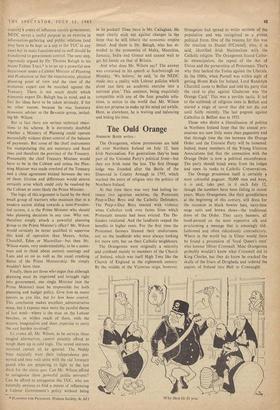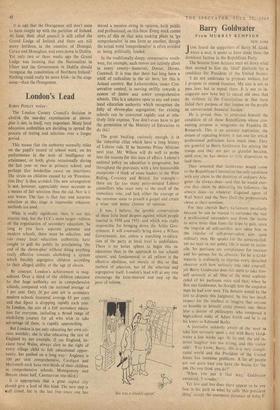The Ould Orange
ANDREW BOYD writes : The Orangemen, whose processions are held all over Northern Ireland on July 12, hate Irish Nationalism. For generations they've been part of the Unionist Party's political front—but they are Irish none the less. The first Orange lodge was founded after the Battle of the Diamond in County Armagh in 1795, which marked the entry of religion into the politics of Northern Ireland.
At that time there was very bad feeling be- tween two agrarian societies, the Protestant Peep-o-Day Boys and the Catholic Defenders. The Peep-o-Day Boys reacted with violence when Catholics took over farms from which Protestant tenants had been evicted. The De- fenders retaliated. And the landlords reaped the benefits in higher rents. For the first time the Protestant farmers blamed their misfortunes, no on the landlords who were always looking for more rent, but on their Catholic neighbours.
The Orangemen were originally a minority and confined mainly to members of the Church of Ireland, which was itself High Tory like the Church of England in the eighteenth century. By the middle of the Victorian reign, however. Orangeism had spread to wider sections of the population and was recognised as a potent political force. One of the reasons for this was the reaction to Daniel O'Connell, who, it is said, identified Irish Nationalism with the Catholic religion. The Orangemen feared Catho- lic emancipation, the repeal of the Act of Union and the persecution of Protestants. That's why they backed the Tories against the Liberals. In the 1880s, when Parnell was within sight of getting Home Rule for Ireland, Lord Randolph Churchill came to Belfast and told his party that the card to play against Gladstone was 'the Orange Card.' This was a terrible tactic. It led to the outbreak of religious riots in Belfast and started a reign of terror that did not die out until fairly recently. The last pogrom against Catholics in Belfast was in 1935.
Those who desire a liberalisation of politics in Northern Ireland hope that the annual pro- cessions are now little more than pageantry and that through time the ties between the Orange Order and the Unionist Party will be loosened. Indeed, many members of the Young Unionist Associations feel that the connection with the Orange Order is now a political encumbrance. The party should break away from the lodges and open its ranks to Catholic Conservatives.
The Orange procession itself is certainly a most colourful pageant; 50,000 men and boys, it is said, take part in it each July 12, though the numbers have been falling in recent years. Many Orangemen, like their grandfathers at the beginning of this century, still dress for the occasion in black bowler hats, navy-blue serge suits and brown shoes—the traditional dress of the Order. They carry banners, all hand-painted on the most expensive silk and proclaiming a message that is amusingly old- fashioned and often ridiculously contradictory. Where in the world but in Ulster would there be found a procession of 'loyal Queen's men' who honour Oliver Cromwell. Most Orangemen probably wouldn't know what Cromwell did to King Charles, but they do know he cracked the skulls of the friars of Drogheda and ordered the papists of Ireland into Hell or Connaught.
'Why then Ile fit you.'
It is odd that the Orangemen still don't seem to have caught up with the partition of Ireland. At least., their chief council is still called the Grand Lodge of Ireland and there are still many brethren in the counties of Donegal, Cavan and Monaghan, and even down in Dublin. Yet only two or three weeks ago the Grand Lodge was insisting that the Nationalists in Ulster and the Government in Dublin should 'recognise the constitution of Northern Ireland.' Nothing could really be more Irish—in the stage sense—than the Orangemen.



































 Previous page
Previous page